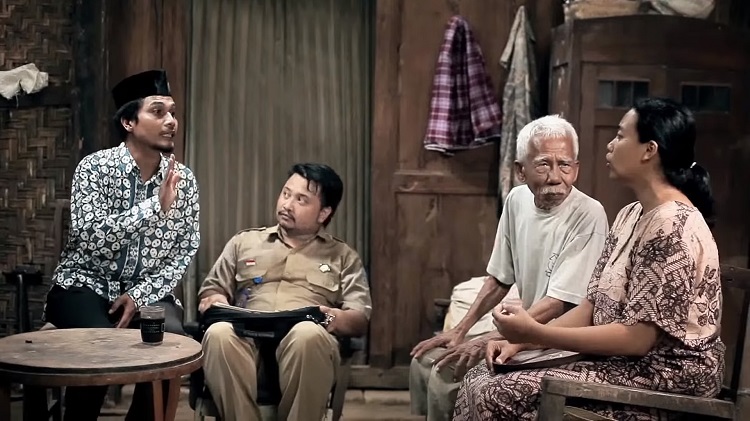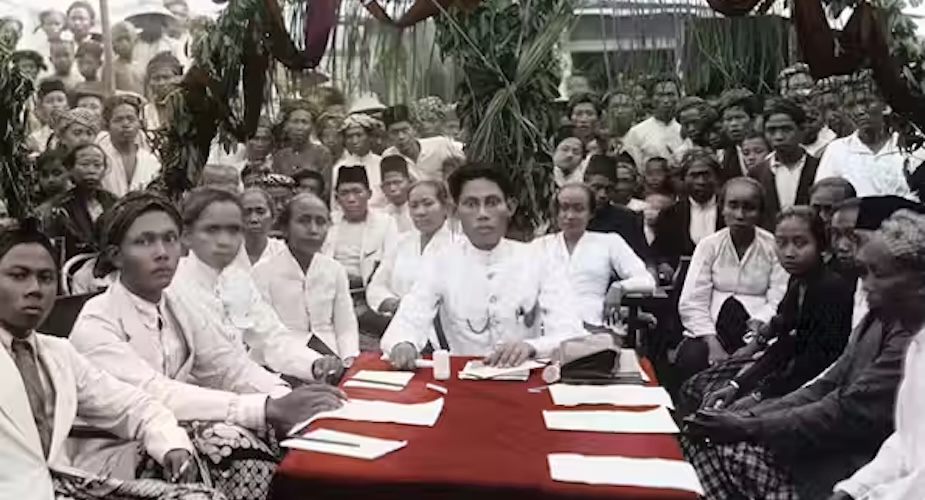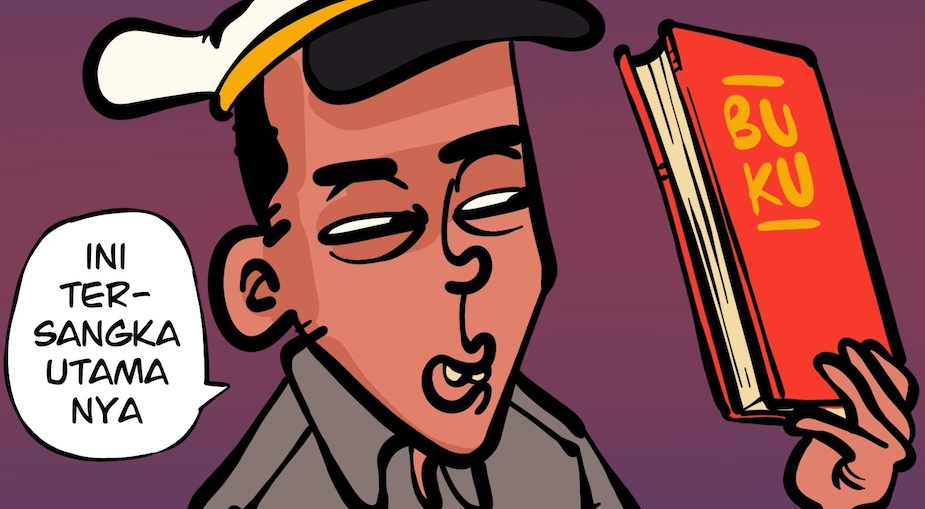A census worker’s village visit reveals the absurdities of identity card data
KTP , a short film by the Yogyakarta filmmakers Shinta Oktania Retnani (producer) and Bobby Prasetyo (director/screenwriter) has been a favourite on social media since its release in 2016. Spiced up with the ironic and piercing wit of Yogyakarta’s intellectual scene, it provides fascinating insight into the difficulties of religious pluralism in Indonesia. The humorous but realistic problem it brings to light has since become more visible following a 2017 ruling that permitted new levels of religious diversity.
The film portrays a census worker named Darno visiting a village near Yogyakarta. His task is to interview any locals who lack the reading and writing abilities to fill out their census form and to order their KTP, or identity card. All he is asking them for is ‘data’ which most Westerners might assume would not pose any serious problems. However, as is often the case in Southeast Asia, ‘data’ and humanity can be at odds.
Researchers in Southeast Asia have long observed how national governments’ acts of classification have the potential to create conflicts with the established patterns of village life. Benedict Anderson used the term ‘seriality’ to describe this work of classification. The data collected for the KTP card is the most prominent kind of seriality in contemporary Indonesia.

In the film, Darno arrives at the house of an elderly man called mbah (Grandpa) Karsono. He is immediately taken aback by mbah Karsono’s relaxed response to the formal Islamic greeting ‘assalamualaikum’. Darno needs Karsono’s age and religion to properly identify him for his KTP. But Karsono does not know when he was born and the only religion he is familiar with is Kejawen, the traditional worship of the ancestors.
Census workers in Indonesia will gladly assign random birthdays to those who do not know their age, but religion poses a serious problem. Until a 2017 court ruling, the government mandated that all Indonesian citizens belong to one of six religions – Islam, Buddhism, Hinduism, Catholicism, Protestant Christianity or Confucianism – which were purported to coexist in ultimate harmony based on mutual recognition of the existence of a single God. Every Indonesian’s KTP indicates their religious affiliation, but Kejawen, an old Javanese mix of animistic and mystical beliefs, was not one of the six acceptable religions.
Mbah Karsono pays his respects to his ancestors and keeps his Kejawen customs. This has worked for him throughout his life, but until the 2017 ruling, the government did not recognise this answer. The census worker, a Muslim, suggests that maybe Karsono could call himself a Muslim as well, but Karsono rejects this because he has never done Islamic prayers (sholat). We can imagine the filmmaker’s satirical grin when we hear the census worker Darno’s embarrassed response to this reasoning: admitting that he has never done the prayers either!
This dialogue reminds us that labels like ‘Muslim’ can conceal just as much as they inform. Among those who the government calls Muslims are the devout faithful (santri) but also millions of ‘Islam KTP’ for whom Islam goes no further than their ID cards – and the vast majority are somewhere in between (abangan), fasting on Ramadan but not praying, or mixing some level of Islamic scruples with traditional astrology and shamanism. The label ‘Islam’ as used on the KTP doesn’t require any real commitment to observance, and in the past many Kejawen practitioners have chosen to classify themselves as Muslims despite lacking any familiarity with Islam.

So, this film asks, what does that ‘religion’ line on the KTP really mean? Belief in God has been part of the national philosophy, Pancasila, of independent Indonesia because it both offers a compromise to religious groups and excludes ideas the state considers too dangerous. If we assert that everyone believes in God in their own way, the theory goes, we can affirm that the religions of the country pose no political threat to each other, and also fend off revolutionary, atheistic Communism. When the non-religious mbah Karsono’s daughter drops in and spooks the census worker by asking about a borrowed hammer and sickle, the viewer is aware that this is a sly reference to a dark time in Indonesian history.
The KTP interview starts out with just Darno and mbah Karsono in the room, but as the elder is more and more flummoxed by Darno’s questions about his familiarity with arcane religious concepts other characters enter the scene. Karsono’s daughter calls in a stock headman character, who comically tries to show off his limited knowledge of English to the visitor from the city, but in the end offers no solution. Darno is pushed to assign Karsono a religion randomly, but he protests that he would lose his job if he ‘falsified’ the census form. Even when it is impossible to match reality to the check-boxes, the state reserves the right to punish inaccurate answers.
More and more villagers let themselves in and offer their advice on how to handle this problem that the government has created. As they do, we start to get a very different picture of how Indonesians live in harmony. We hear from Sri Afro, whose hairstyle is unmistakable, and Susi Parabola (Antenna Susie), whose household apparently gets satellite television. These villagers already have their own method of classifying each other, completely unrelated to how the government sees things. Mbah Karsono too, already has his classification as a neighbor and as a familiar face in the village.

It is only a natural conclusion then, that when the entire village manages to crowd into the house, they agree that they can all support mbah Karsono so he won’t need a KTP to pay any medical fees he might incur. The census worker feebly protests, saying something about government regulations, but he is shouted down – the villagers do not want to hear about the troublesome government anymore. They have a different way of being Indonesian: gotong-royong, or communal spirit, where hijabis, rebels and village clowns all support each other, but not because the government has sorted them into ‘religions’.
Mbah Karsono’s particular struggle is fictional but it will remind viewers of the real problems created by KTP, which are familiar to millions of Indonesians. A local critic’s review of this film suggests that ‘the state's rules in this regard for making ID cards turned out to be a source of problems for the poor’, and while the specific situation shown in the film changed after 2017, it still serves to remind us that Indonesian culture is more than what can be captured on paper. Indonesia’s diversity and the communal spirit of its village life is not something that can be captured through any classification.
KTP (2016), Shinta Oktania Retnani (producer), Bobby Prasetyo (director/screenwriter), 15 minutes.
Avery Morrow holds a master’s degree in Religious Studies from the University of Tokyo. His research into Japanese and Asian traditions has been published in several academic journals.















